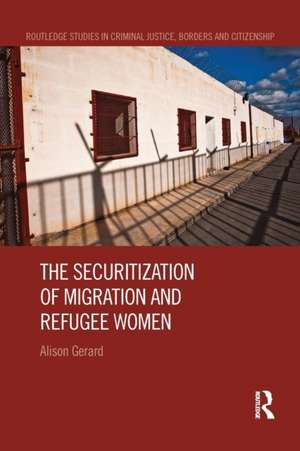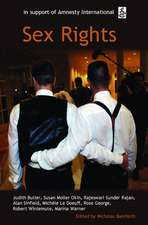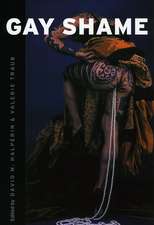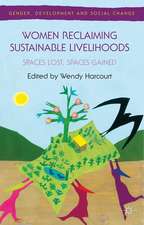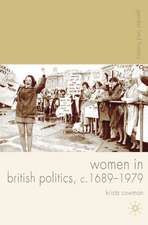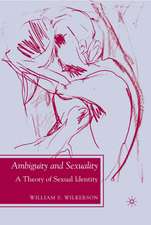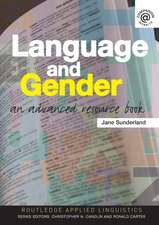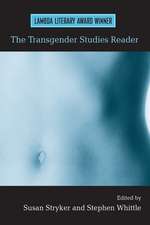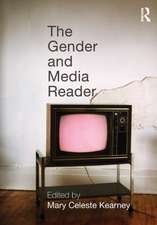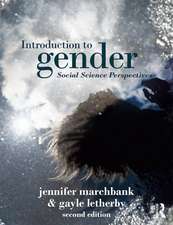The Securitization of Migration and Refugee Women: Routledge Studies in Criminal Justice, Borders and Citizenship
Autor Alison Gerarden Limba Engleză Paperback – 3 mar 2016
The Southern EU Member State of Malta finds itself on the frontline of policing and securing Europe’s southern external borders against transnational migrants and preventing migrants’ on-migration to other Member States within the EU. The securitization of migration has been responsible for restricting access to asylum, diluting rights and entitlements to refugee protection, and punishing those who arrive in the EU without valid passports –a visibly racialised and gendered population. The stories of the refugee women interviewed for this research detail the ways in which refugee protection is being eroded, selectively applied and in some cases specifically designed to exclude.
In contrast to the majority of migration literature, which has largely focused on the male experience, this book focuses on the experiences of refugee women and aims to contribute to the volume of work dedicated to analysing borders from the perspective of those who cross them. This research strengthens existing criminological literature and has the potential to offer insights to policy makers around the world. It will be of interest to academics and students interested in International Crime and Justice, Securitisation, Refugee Law and Border Control, as well as the general reader.
| Toate formatele și edițiile | Preț | Express |
|---|---|---|
| Paperback (1) | 432.29 lei 6-8 săpt. | |
| Taylor & Francis – 3 mar 2016 | 432.29 lei 6-8 săpt. | |
| Hardback (1) | 1169.78 lei 6-8 săpt. | |
| Taylor & Francis – 19 mai 2014 | 1169.78 lei 6-8 săpt. |
Din seria Routledge Studies in Criminal Justice, Borders and Citizenship
-
 Preț: 277.76 lei
Preț: 277.76 lei -
 Preț: 326.55 lei
Preț: 326.55 lei -
 Preț: 286.80 lei
Preț: 286.80 lei -
 Preț: 310.08 lei
Preț: 310.08 lei -
 Preț: 385.54 lei
Preț: 385.54 lei - 17%
 Preț: 259.51 lei
Preț: 259.51 lei -
 Preț: 469.34 lei
Preț: 469.34 lei -
 Preț: 479.63 lei
Preț: 479.63 lei - 12%
 Preț: 325.34 lei
Preț: 325.34 lei -
 Preț: 410.46 lei
Preț: 410.46 lei -
 Preț: 384.02 lei
Preț: 384.02 lei -
 Preț: 449.41 lei
Preț: 449.41 lei -
 Preț: 409.48 lei
Preț: 409.48 lei -
 Preț: 386.13 lei
Preț: 386.13 lei -
 Preț: 384.59 lei
Preț: 384.59 lei -
 Preț: 385.62 lei
Preț: 385.62 lei - 18%
 Preț: 1003.43 lei
Preț: 1003.43 lei -
 Preț: 388.30 lei
Preț: 388.30 lei -
 Preț: 389.38 lei
Preț: 389.38 lei - 31%
 Preț: 763.39 lei
Preț: 763.39 lei - 9%
 Preț: 1007.42 lei
Preț: 1007.42 lei - 18%
 Preț: 1054.58 lei
Preț: 1054.58 lei
Preț: 432.29 lei
Nou
Puncte Express: 648
Preț estimativ în valută:
82.72€ • 86.61$ • 68.61£
82.72€ • 86.61$ • 68.61£
Carte tipărită la comandă
Livrare economică 10-24 aprilie
Preluare comenzi: 021 569.72.76
Specificații
ISBN-13: 9781138666016
ISBN-10: 1138666017
Pagini: 288
Ilustrații: 24
Dimensiuni: 156 x 234 x 14 mm
Greutate: 0.36 kg
Ediția:1
Editura: Taylor & Francis
Colecția Routledge
Seria Routledge Studies in Criminal Justice, Borders and Citizenship
Locul publicării:Oxford, United Kingdom
ISBN-10: 1138666017
Pagini: 288
Ilustrații: 24
Dimensiuni: 156 x 234 x 14 mm
Greutate: 0.36 kg
Ediția:1
Editura: Taylor & Francis
Colecția Routledge
Seria Routledge Studies in Criminal Justice, Borders and Citizenship
Locul publicării:Oxford, United Kingdom
Public țintă
Postgraduate and UndergraduateCuprins
Chapter 1. Introduction: Irregular migration, women and Malta Chapter 2. The securitization of migration: deterring, punishing, and reducing the aggregate risk of global mobility Chapter 3. Regimes in conflict: refugee protection and the securitization of migration – a gendered analysis Chapter 4. Violent and circuitous pathways: women’s experiences in exiting Somalia Chapter 5. From Somalia to Malta: violence and survival in transit Chapter 6. Punishment for ‘crimes of arrival’: women’s experiences of Malta Chapter 7. When will the journey end? Cycles of containment and control in selecting individuals for onward migration Chapter 8. Regimes in conflict: the impact of the securitization of migration on refugee women – a humanized account.
Notă biografică
Dr Alison Gerard is a lawyer and Senior Lecturer in Justice Studies at Charles Sturt University. Her research program examines the impact of the securitisation of migration, particularly its impact on refugee women. Dr Gerard’s wider research program includes analysis of intersections of gender, race and class including specific areas such as deaths in custody, sex work and ‘crimmigration’ practices in Australia. Alison is a contributor to the Border Observatory Project hosted by Monash University, Australia and Border Criminologies hosted by Oxford University, UK.
Recenzii
‘The Securitization of Migration and Refugee Women provides compelling evidence that a gendered analysis is essential for understanding the unique character of refugee women’s social exclusion, economic vulnerability, health risks, and experiences of danger and violence at all stages of their migration journey. Eloquently written and carefully researched, it is essential reading for those interested in migration and refugee policy, border enforcement, gender and human rights.’ - Nancy A. Wonders, Northern Arizona University, USA
‘Alison Gerard has conducted an exemplary piece of feminist research, charting the fraught journeys of Somali women as they seek a secure future in Europe. The book combines rigorous socio-legal analysis, bold theoretical framing and unique data obtained by "hanging out" with Somali women who have negotiated the hazardous route to Malta. Using powerful first-hand accounts Gerard is able to bring home the true meaning, in human terms, of the securitization of borders.’ - Leanne Weber, Senior Research Fellow, Monash University, Australia
'The thorough analysis provided by Gerard makes this book a highly recommended read for a wide-ranging audience, from NGO personnel to policy-makers and legislators. Overall, this book achieves its main goal and contributes significantly to the debate on the tensions between the securitization of migration and the refugee protection framework.' - Angelo Tramountanis, Border Criminologies
‘Alison Gerard has conducted an exemplary piece of feminist research, charting the fraught journeys of Somali women as they seek a secure future in Europe. The book combines rigorous socio-legal analysis, bold theoretical framing and unique data obtained by "hanging out" with Somali women who have negotiated the hazardous route to Malta. Using powerful first-hand accounts Gerard is able to bring home the true meaning, in human terms, of the securitization of borders.’ - Leanne Weber, Senior Research Fellow, Monash University, Australia
'The thorough analysis provided by Gerard makes this book a highly recommended read for a wide-ranging audience, from NGO personnel to policy-makers and legislators. Overall, this book achieves its main goal and contributes significantly to the debate on the tensions between the securitization of migration and the refugee protection framework.' - Angelo Tramountanis, Border Criminologies
Descriere
The Securitization of Migration and Refugee Women explores the journey made by refugee women who have travelled from Somalia to the EU to seek asylum. In contrast to the majority of migration literature, which has largely focused on the male experience, this book focuses on the experiences of refugee women and aims to contribute to the volume of work dedicated to analysing borders from the perspective of those who cross them.
